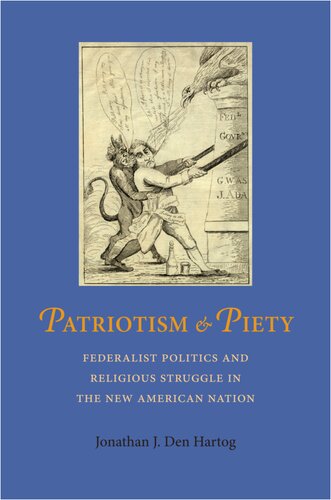

Most ebook files are in PDF format, so you can easily read them using various software such as Foxit Reader or directly on the Google Chrome browser.
Some ebook files are released by publishers in other formats such as .awz, .mobi, .epub, .fb2, etc. You may need to install specific software to read these formats on mobile/PC, such as Calibre.
Please read the tutorial at this link: https://ebookbell.com/faq
We offer FREE conversion to the popular formats you request; however, this may take some time. Therefore, right after payment, please email us, and we will try to provide the service as quickly as possible.
For some exceptional file formats or broken links (if any), please refrain from opening any disputes. Instead, email us first, and we will try to assist within a maximum of 6 hours.
EbookBell Team

5.0
100 reviewsIn Patriotism and Piety, Jonathan Den Hartog argues that the question of how religion would function in American society was decided in the decades after the Constitution and First Amendment established a legal framework. Den Hartog shows that among the wide array of politicians and public figures struggling to define religion’s place in the new nation, Federalists stood out―evolving religious attitudes were central to Federalism, and the encounter with Federalism strongly shaped American Christianity.
Den Hartog describes the Federalist appropriations of religion as passing through three stages: a "republican" phase of easy cooperation inherited from the experience of the American Revolution; a "combative" phase, forged during the political battles of the 1790s–1800s, when the destiny of the republic was hotly contested; and a "voluntarist" phase that grew in importance after 1800. Faith became more individualistic and issue-oriented as a result of the actions of religious Federalists.
Religious impulses fueled party activism and informed governance, but the redirection of religious energies into voluntary societies sapped party momentum, and religious differences led to intraparty splits. These developments altered not only the Federalist Party but also the practice and perception of religion in America, as Federalist insights helped to create voluntary, national organizations in which Americans could practice their faith in interdenominational settings.
Patriotism and Pietyfocuses on the experiences and challenges confronted by a number of Federalists, from well-known leaders such as John Adams, John Jay, Charles Cotesworth Pinckney, and Timothy Dwight to lesser-known but still important figures such as Caleb Strong, Elias Boudinot, and William Jay.